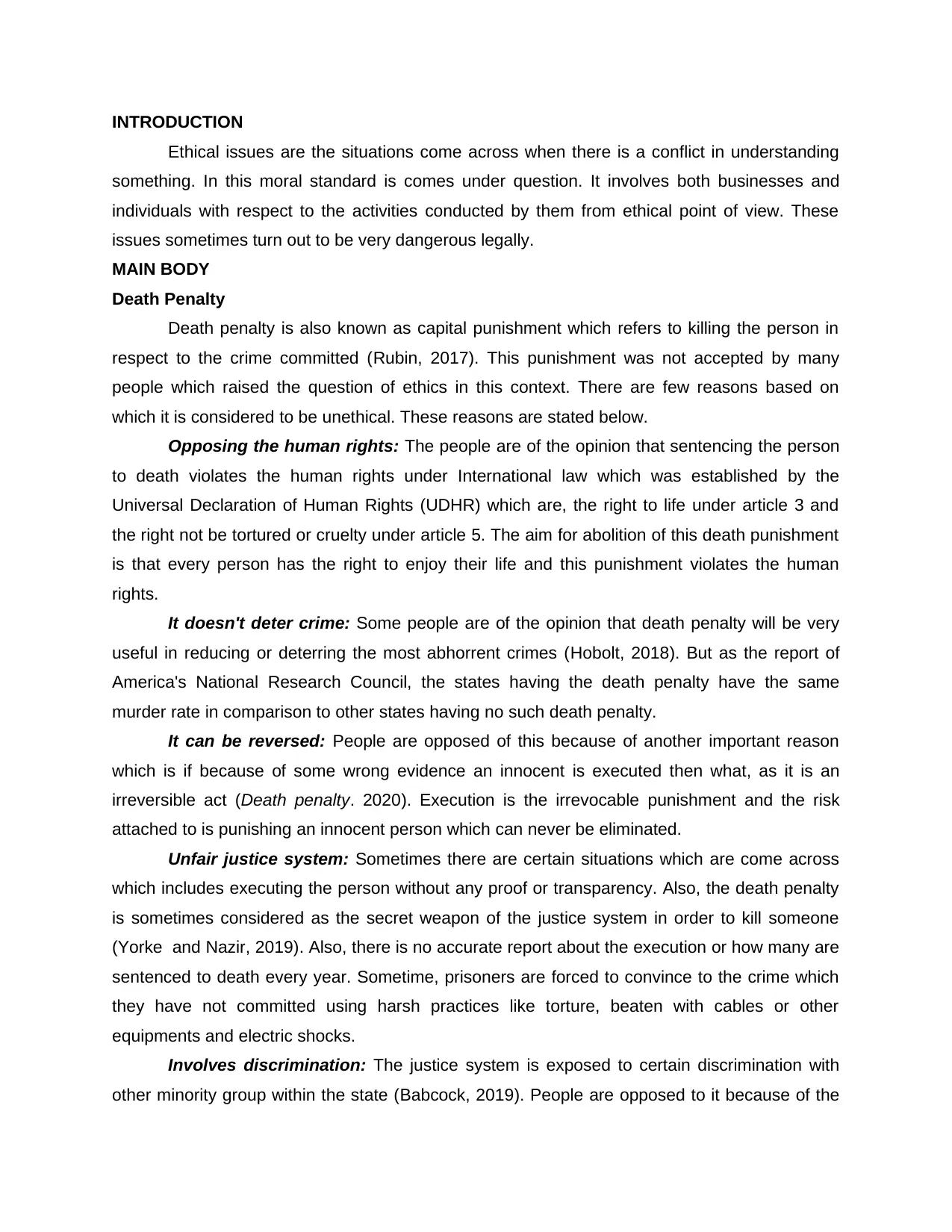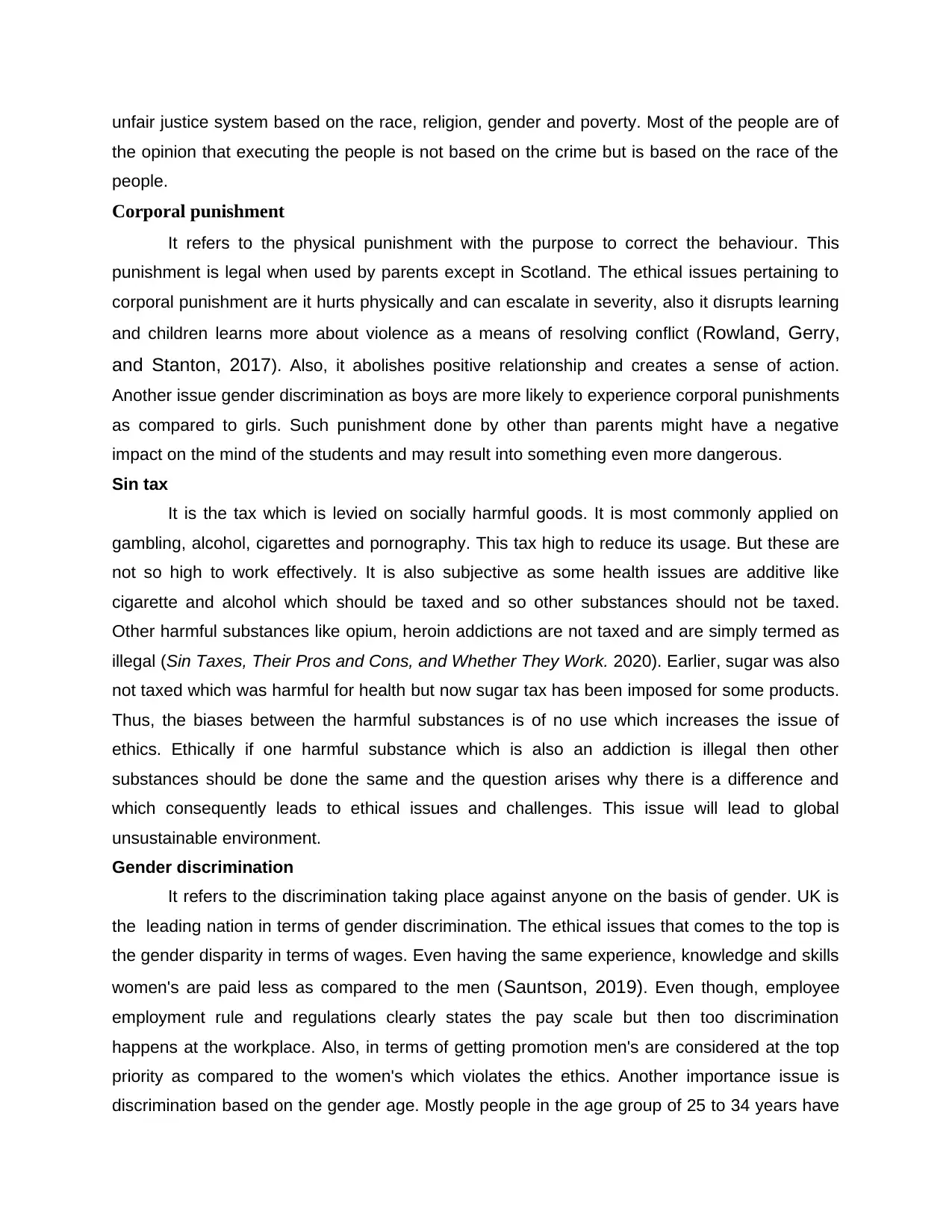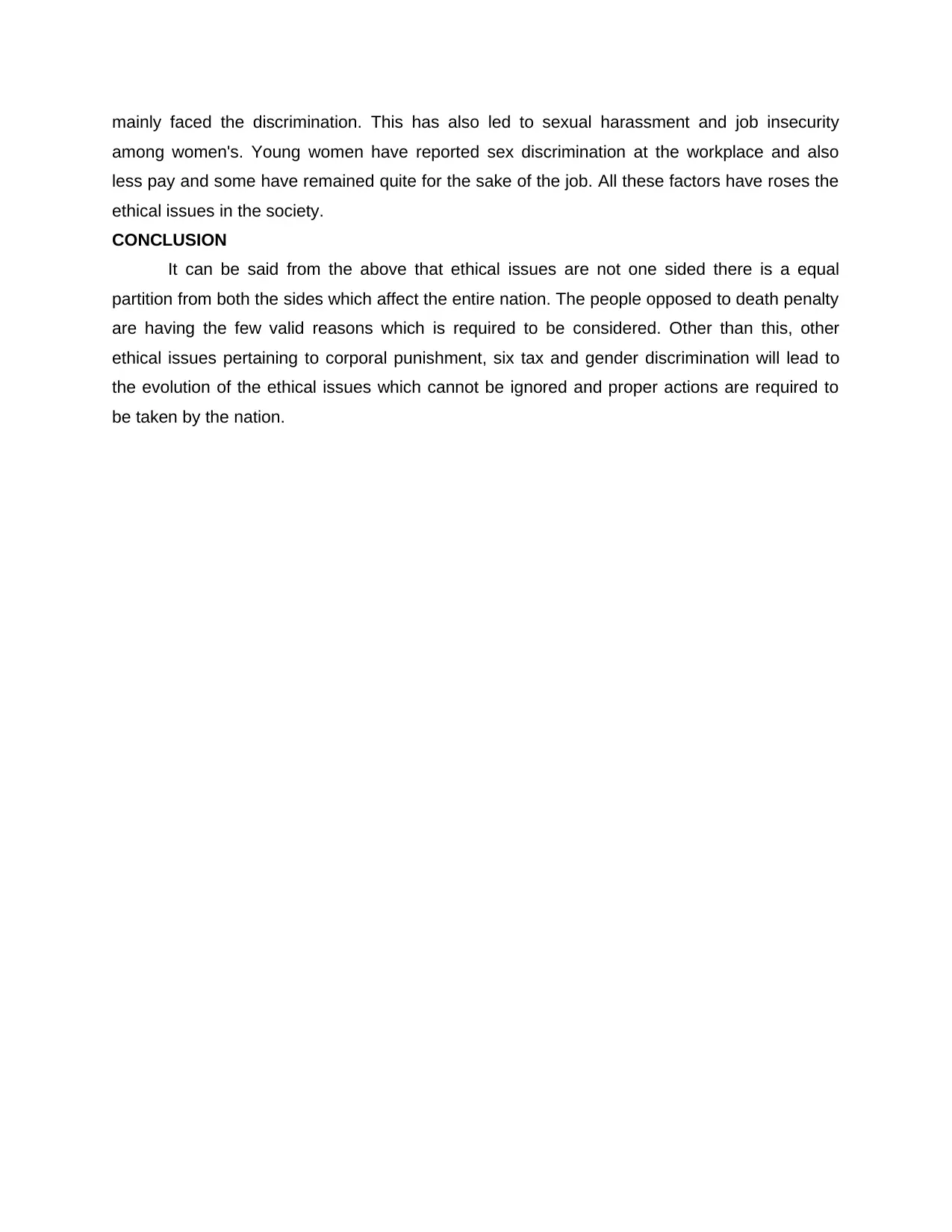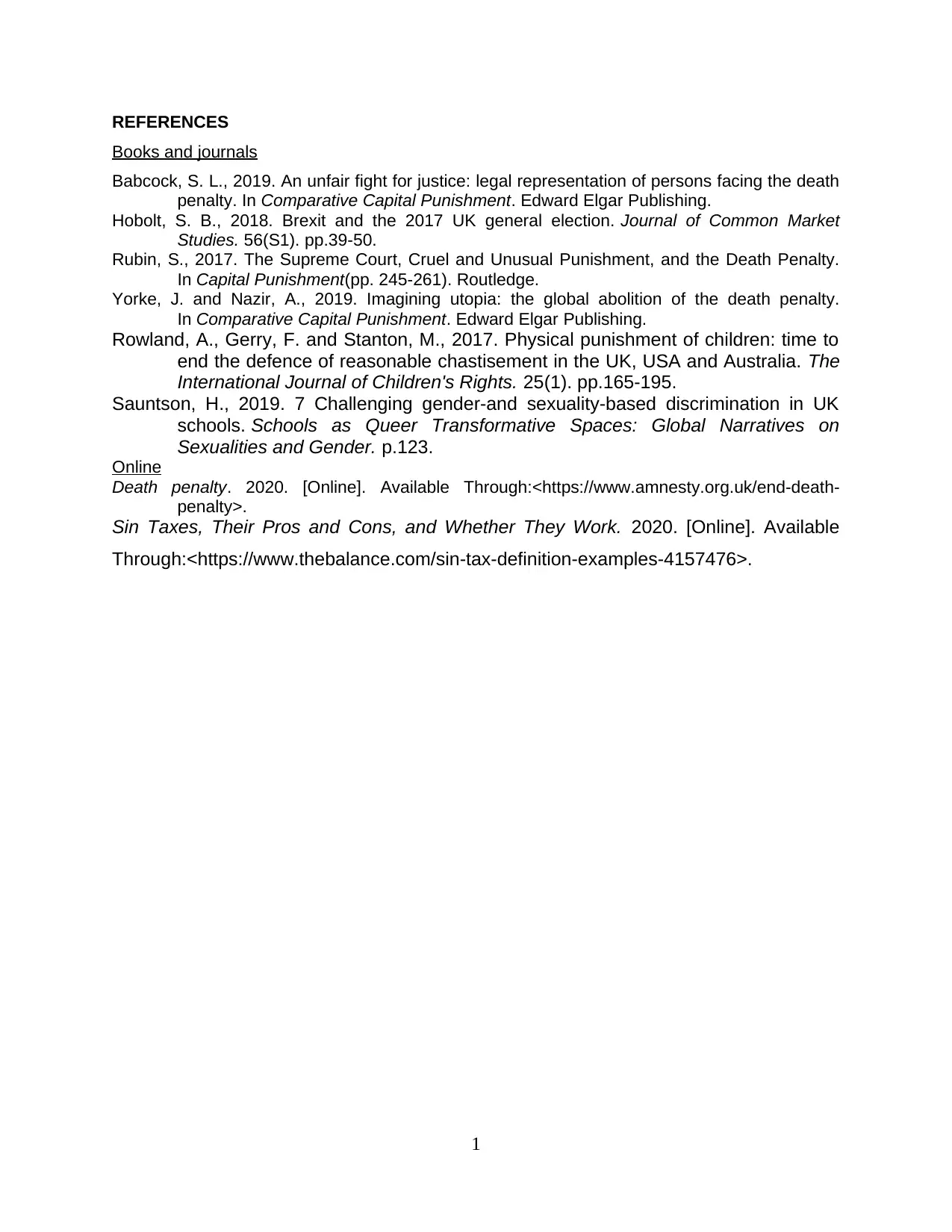Ethical Issues: Analysis of Death Penalty, Sin Tax, and Discrimination
VerifiedAdded on 2023/01/12
|6
|1405
|72
Essay
AI Summary
This essay delves into several critical ethical issues, providing an in-depth analysis of the death penalty, corporal punishment, sin taxes, and gender discrimination. The essay explores the arguments against the death penalty, including human rights violations, the lack of deterrence, the risk of executing innocent individuals, and the potential for an unfair justice system. It also examines corporal punishment, discussing its physical and psychological impacts, its disruption of learning, and its potential for gender discrimination. Furthermore, the essay investigates the ethics of sin taxes, considering their effectiveness, subjectivity, and the biases they can create between different harmful substances. Finally, the essay addresses the ethical challenges of gender discrimination in the workplace, including wage disparities, promotion biases, and sexual harassment, which violate ethical principles. The conclusion emphasizes the need for action to address these ethical concerns.

Ethical Issues
Paraphrase This Document
Need a fresh take? Get an instant paraphrase of this document with our AI Paraphraser

TABLE OF CONTENTS
INTRODUCTION......................................................................................................................... 3
MAIN BODY................................................................................................................................. 3
CONCLUSION............................................................................................................................. 4
REFERENCES............................................................................................................................ 1
INTRODUCTION......................................................................................................................... 3
MAIN BODY................................................................................................................................. 3
CONCLUSION............................................................................................................................. 4
REFERENCES............................................................................................................................ 1

INTRODUCTION
Ethical issues are the situations come across when there is a conflict in understanding
something. In this moral standard is comes under question. It involves both businesses and
individuals with respect to the activities conducted by them from ethical point of view. These
issues sometimes turn out to be very dangerous legally.
MAIN BODY
Death Penalty
Death penalty is also known as capital punishment which refers to killing the person in
respect to the crime committed (Rubin, 2017). This punishment was not accepted by many
people which raised the question of ethics in this context. There are few reasons based on
which it is considered to be unethical. These reasons are stated below.
Opposing the human rights: The people are of the opinion that sentencing the person
to death violates the human rights under International law which was established by the
Universal Declaration of Human Rights (UDHR) which are, the right to life under article 3 and
the right not be tortured or cruelty under article 5. The aim for abolition of this death punishment
is that every person has the right to enjoy their life and this punishment violates the human
rights.
It doesn't deter crime: Some people are of the opinion that death penalty will be very
useful in reducing or deterring the most abhorrent crimes (Hobolt, 2018). But as the report of
America's National Research Council, the states having the death penalty have the same
murder rate in comparison to other states having no such death penalty.
It can be reversed: People are opposed of this because of another important reason
which is if because of some wrong evidence an innocent is executed then what, as it is an
irreversible act (Death penalty. 2020). Execution is the irrevocable punishment and the risk
attached to is punishing an innocent person which can never be eliminated.
Unfair justice system: Sometimes there are certain situations which are come across
which includes executing the person without any proof or transparency. Also, the death penalty
is sometimes considered as the secret weapon of the justice system in order to kill someone
(Yorke and Nazir, 2019). Also, there is no accurate report about the execution or how many are
sentenced to death every year. Sometime, prisoners are forced to convince to the crime which
they have not committed using harsh practices like torture, beaten with cables or other
equipments and electric shocks.
Involves discrimination: The justice system is exposed to certain discrimination with
other minority group within the state (Babcock, 2019). People are opposed to it because of the
Ethical issues are the situations come across when there is a conflict in understanding
something. In this moral standard is comes under question. It involves both businesses and
individuals with respect to the activities conducted by them from ethical point of view. These
issues sometimes turn out to be very dangerous legally.
MAIN BODY
Death Penalty
Death penalty is also known as capital punishment which refers to killing the person in
respect to the crime committed (Rubin, 2017). This punishment was not accepted by many
people which raised the question of ethics in this context. There are few reasons based on
which it is considered to be unethical. These reasons are stated below.
Opposing the human rights: The people are of the opinion that sentencing the person
to death violates the human rights under International law which was established by the
Universal Declaration of Human Rights (UDHR) which are, the right to life under article 3 and
the right not be tortured or cruelty under article 5. The aim for abolition of this death punishment
is that every person has the right to enjoy their life and this punishment violates the human
rights.
It doesn't deter crime: Some people are of the opinion that death penalty will be very
useful in reducing or deterring the most abhorrent crimes (Hobolt, 2018). But as the report of
America's National Research Council, the states having the death penalty have the same
murder rate in comparison to other states having no such death penalty.
It can be reversed: People are opposed of this because of another important reason
which is if because of some wrong evidence an innocent is executed then what, as it is an
irreversible act (Death penalty. 2020). Execution is the irrevocable punishment and the risk
attached to is punishing an innocent person which can never be eliminated.
Unfair justice system: Sometimes there are certain situations which are come across
which includes executing the person without any proof or transparency. Also, the death penalty
is sometimes considered as the secret weapon of the justice system in order to kill someone
(Yorke and Nazir, 2019). Also, there is no accurate report about the execution or how many are
sentenced to death every year. Sometime, prisoners are forced to convince to the crime which
they have not committed using harsh practices like torture, beaten with cables or other
equipments and electric shocks.
Involves discrimination: The justice system is exposed to certain discrimination with
other minority group within the state (Babcock, 2019). People are opposed to it because of the
⊘ This is a preview!⊘
Do you want full access?
Subscribe today to unlock all pages.

Trusted by 1+ million students worldwide

unfair justice system based on the race, religion, gender and poverty. Most of the people are of
the opinion that executing the people is not based on the crime but is based on the race of the
people.
Corporal punishment
It refers to the physical punishment with the purpose to correct the behaviour. This
punishment is legal when used by parents except in Scotland. The ethical issues pertaining to
corporal punishment are it hurts physically and can escalate in severity, also it disrupts learning
and children learns more about violence as a means of resolving conflict (Rowland, Gerry,
and Stanton, 2017). Also, it abolishes positive relationship and creates a sense of action.
Another issue gender discrimination as boys are more likely to experience corporal punishments
as compared to girls. Such punishment done by other than parents might have a negative
impact on the mind of the students and may result into something even more dangerous.
Sin tax
It is the tax which is levied on socially harmful goods. It is most commonly applied on
gambling, alcohol, cigarettes and pornography. This tax high to reduce its usage. But these are
not so high to work effectively. It is also subjective as some health issues are additive like
cigarette and alcohol which should be taxed and so other substances should not be taxed.
Other harmful substances like opium, heroin addictions are not taxed and are simply termed as
illegal (Sin Taxes, Their Pros and Cons, and Whether They Work. 2020). Earlier, sugar was also
not taxed which was harmful for health but now sugar tax has been imposed for some products.
Thus, the biases between the harmful substances is of no use which increases the issue of
ethics. Ethically if one harmful substance which is also an addiction is illegal then other
substances should be done the same and the question arises why there is a difference and
which consequently leads to ethical issues and challenges. This issue will lead to global
unsustainable environment.
Gender discrimination
It refers to the discrimination taking place against anyone on the basis of gender. UK is
the leading nation in terms of gender discrimination. The ethical issues that comes to the top is
the gender disparity in terms of wages. Even having the same experience, knowledge and skills
women's are paid less as compared to the men (Sauntson, 2019). Even though, employee
employment rule and regulations clearly states the pay scale but then too discrimination
happens at the workplace. Also, in terms of getting promotion men's are considered at the top
priority as compared to the women's which violates the ethics. Another importance issue is
discrimination based on the gender age. Mostly people in the age group of 25 to 34 years have
the opinion that executing the people is not based on the crime but is based on the race of the
people.
Corporal punishment
It refers to the physical punishment with the purpose to correct the behaviour. This
punishment is legal when used by parents except in Scotland. The ethical issues pertaining to
corporal punishment are it hurts physically and can escalate in severity, also it disrupts learning
and children learns more about violence as a means of resolving conflict (Rowland, Gerry,
and Stanton, 2017). Also, it abolishes positive relationship and creates a sense of action.
Another issue gender discrimination as boys are more likely to experience corporal punishments
as compared to girls. Such punishment done by other than parents might have a negative
impact on the mind of the students and may result into something even more dangerous.
Sin tax
It is the tax which is levied on socially harmful goods. It is most commonly applied on
gambling, alcohol, cigarettes and pornography. This tax high to reduce its usage. But these are
not so high to work effectively. It is also subjective as some health issues are additive like
cigarette and alcohol which should be taxed and so other substances should not be taxed.
Other harmful substances like opium, heroin addictions are not taxed and are simply termed as
illegal (Sin Taxes, Their Pros and Cons, and Whether They Work. 2020). Earlier, sugar was also
not taxed which was harmful for health but now sugar tax has been imposed for some products.
Thus, the biases between the harmful substances is of no use which increases the issue of
ethics. Ethically if one harmful substance which is also an addiction is illegal then other
substances should be done the same and the question arises why there is a difference and
which consequently leads to ethical issues and challenges. This issue will lead to global
unsustainable environment.
Gender discrimination
It refers to the discrimination taking place against anyone on the basis of gender. UK is
the leading nation in terms of gender discrimination. The ethical issues that comes to the top is
the gender disparity in terms of wages. Even having the same experience, knowledge and skills
women's are paid less as compared to the men (Sauntson, 2019). Even though, employee
employment rule and regulations clearly states the pay scale but then too discrimination
happens at the workplace. Also, in terms of getting promotion men's are considered at the top
priority as compared to the women's which violates the ethics. Another importance issue is
discrimination based on the gender age. Mostly people in the age group of 25 to 34 years have
Paraphrase This Document
Need a fresh take? Get an instant paraphrase of this document with our AI Paraphraser

mainly faced the discrimination. This has also led to sexual harassment and job insecurity
among women's. Young women have reported sex discrimination at the workplace and also
less pay and some have remained quite for the sake of the job. All these factors have roses the
ethical issues in the society.
CONCLUSION
It can be said from the above that ethical issues are not one sided there is a equal
partition from both the sides which affect the entire nation. The people opposed to death penalty
are having the few valid reasons which is required to be considered. Other than this, other
ethical issues pertaining to corporal punishment, six tax and gender discrimination will lead to
the evolution of the ethical issues which cannot be ignored and proper actions are required to
be taken by the nation.
among women's. Young women have reported sex discrimination at the workplace and also
less pay and some have remained quite for the sake of the job. All these factors have roses the
ethical issues in the society.
CONCLUSION
It can be said from the above that ethical issues are not one sided there is a equal
partition from both the sides which affect the entire nation. The people opposed to death penalty
are having the few valid reasons which is required to be considered. Other than this, other
ethical issues pertaining to corporal punishment, six tax and gender discrimination will lead to
the evolution of the ethical issues which cannot be ignored and proper actions are required to
be taken by the nation.

REFERENCES
Books and journals
Babcock, S. L., 2019. An unfair fight for justice: legal representation of persons facing the death
penalty. In Comparative Capital Punishment. Edward Elgar Publishing.
Hobolt, S. B., 2018. Brexit and the 2017 UK general election. Journal of Common Market
Studies. 56(S1). pp.39-50.
Rubin, S., 2017. The Supreme Court, Cruel and Unusual Punishment, and the Death Penalty.
In Capital Punishment(pp. 245-261). Routledge.
Yorke, J. and Nazir, A., 2019. Imagining utopia: the global abolition of the death penalty.
In Comparative Capital Punishment. Edward Elgar Publishing.
Rowland, A., Gerry, F. and Stanton, M., 2017. Physical punishment of children: time to
end the defence of reasonable chastisement in the UK, USA and Australia. The
International Journal of Children's Rights. 25(1). pp.165-195.
Sauntson, H., 2019. 7 Challenging gender-and sexuality-based discrimination in UK
schools. Schools as Queer Transformative Spaces: Global Narratives on
Sexualities and Gender. p.123.
Online
Death penalty. 2020. [Online]. Available Through:<https://www.amnesty.org.uk/end-death-
penalty>.
Sin Taxes, Their Pros and Cons, and Whether They Work. 2020. [Online]. Available
Through:<https://www.thebalance.com/sin-tax-definition-examples-4157476>.
1
Books and journals
Babcock, S. L., 2019. An unfair fight for justice: legal representation of persons facing the death
penalty. In Comparative Capital Punishment. Edward Elgar Publishing.
Hobolt, S. B., 2018. Brexit and the 2017 UK general election. Journal of Common Market
Studies. 56(S1). pp.39-50.
Rubin, S., 2017. The Supreme Court, Cruel and Unusual Punishment, and the Death Penalty.
In Capital Punishment(pp. 245-261). Routledge.
Yorke, J. and Nazir, A., 2019. Imagining utopia: the global abolition of the death penalty.
In Comparative Capital Punishment. Edward Elgar Publishing.
Rowland, A., Gerry, F. and Stanton, M., 2017. Physical punishment of children: time to
end the defence of reasonable chastisement in the UK, USA and Australia. The
International Journal of Children's Rights. 25(1). pp.165-195.
Sauntson, H., 2019. 7 Challenging gender-and sexuality-based discrimination in UK
schools. Schools as Queer Transformative Spaces: Global Narratives on
Sexualities and Gender. p.123.
Online
Death penalty. 2020. [Online]. Available Through:<https://www.amnesty.org.uk/end-death-
penalty>.
Sin Taxes, Their Pros and Cons, and Whether They Work. 2020. [Online]. Available
Through:<https://www.thebalance.com/sin-tax-definition-examples-4157476>.
1
⊘ This is a preview!⊘
Do you want full access?
Subscribe today to unlock all pages.

Trusted by 1+ million students worldwide
1 out of 6
Related Documents
Your All-in-One AI-Powered Toolkit for Academic Success.
+13062052269
info@desklib.com
Available 24*7 on WhatsApp / Email
![[object Object]](/_next/static/media/star-bottom.7253800d.svg)
Unlock your academic potential
Copyright © 2020–2026 A2Z Services. All Rights Reserved. Developed and managed by ZUCOL.





